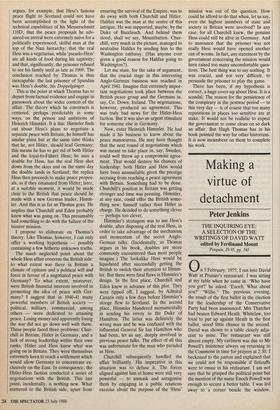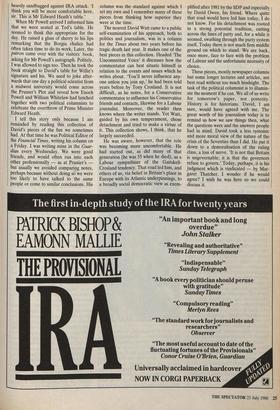Making a virtue of detachment
Peter Jenkins
THE INQUIRING EYE: A SELECTION OF THE WRITINGS OF DAVID WATT edited by Ferdinand Mount
Penguin, f9.95, pp. 343
On 5 February, 1975, I ran into David Watt at Prunier's restaurant. I was sitting at my table when he came in. 'Who have you got?' he asked. 'Enoch. What about you?' Willie.' The previous evening, the result of the first ballot in the election for the leadership of the Conservative Party had been announced. Mrs Thatcher had beaten Edward Heath. Whitelaw, too loyal to put up against Heath in the first ballot, stood little chance in the second. David was shown to a table closely adja- cent to mine. The restaurant was still almost empty. My earliness was due to Mr Powell's insistence always on returning to the Commons in time for prayers at 2.30. I beckoned to the patron and explained that we could not be responsible if fisticuffs were to ensue in his restaurant. I am not sure that he grasped the political point but the mention of the name Enoch Powell was enough to secure a better table. I was led away to a corner beside the window, heavily sandbagged against IRA attack. 'I think you will be more comfortable here, sir. This is Mr Edward Heath's table.'
When Mr Powell arrived I informed him that we were seated at Ted's table. He seemed to think this appropriate for the day. He raised a glass of sherry to his lips remarking that the Borgia chalice had often taken time to do its work. Later, the patron came over with the visitors' book, asking for Mr Powell's autograph. Politely, I was allowed to sign too. Then he took the book straight to David's table for Willie's signature and his. We used to joke after- wards that one day a political scientist from a midwest university would come across the Prunier's Plot and reveal how Enoch Powell and William Whitelaw had lunched together with two political columnists to celebrate the overthrow of Prime Minister Edward Heath.
I tell this story only because I am reminded by reading this collection of David's pieces of the fun we sometimes had. At that time he was Political Editor of the Financial Times, writing his column on a Friday. I was writing mine in the Guar- dian every Wednesday. We were good friends, and would often run into each other professionally — as at Prunier's but usually we avoided comparing notes, perhaps because without doing sd we were too likely to have talked to the same people or come to similar conclusions. His column was the standard against which I set my own and I remember many of these pieces from thinking how superior they were at the time.
The nearest David Watt came to a public self-examination of his approach, both to politics and journalism, was in a column for the Times about two years before his tragic death last year. It makes one of the best pieces in this collection. Headed 'The Uncommitted Voice' it discusses how the commentator can best situate himself in relation to the events and issues which he writes about. 'You'll never influence any- one unless you join up,' he had been told years before by Tony Crosland. It is not difficult, as he notes, for a Conservative commentator to influence his Conservative friends and contacts, likewise for a Labour journalist. Moreover, the reader then knows where the writer stands. Yet Watt, guided by his own temperament, chose detachment and tried to make a virtue of it. This collection shows, I think, that he largely succeeded. He was aware, however, that the role was becoming more uncomfortable. He had started out, as did many of that generation (he was 55 when he died), as a Labour sympathiser of the Gaitskell- Crosland tendency. That road led him, and others of us, via belief in Britain's place in Europe with its Atlantic underpinnings, to a broadly social democratic view as exem- plified after 1981 by the SDP and especially by David Owen, his friend. Where quite that road would have led him today, I do not know. For his detachment was rooted in a strong potential tradition, cutting across the lines of party and, for a while it seemed, swathing through the party system itself. Today there is not much firm middle ground on which to stand. We are back, once more, face to face with the problem of Labour and the unfortunate necessity of choice.
These pieces, mostly newspaper columns but some longer lectures and articles, are best read without too much hindsight. The task of the political columnist is to illumin- ate the moment if he can. We all of us write for tomorrow's paper, not posterity. History is for historians. David, I am sure, would have agreed with me. The great worth of his journalism today is to remind us how we saw things then, what the questions were and the answers people had in mind. David took a less systemic and more moral view of the nature of the crisis of the Seventies than I did. He put it down to a demoralisation of the ruling class, a loss of nerve. 'It is not that Britain is ungovernable; it is that the governors refuse to govern.' Today, perhaps, it is his judgment which is vindicated — by Mar- garet Thatcher. I wonder if he would agree? I wish he was here so we could discuss it.















































 Previous page
Previous page